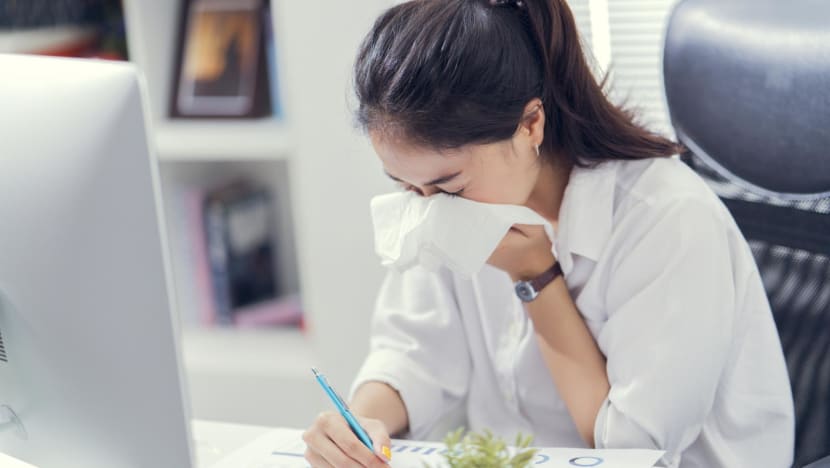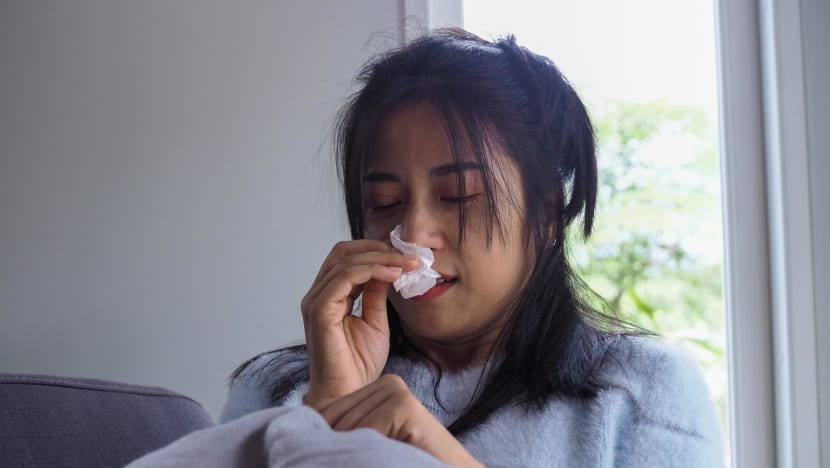Commentary: Why are sinus problems so common in Singapore?
Constant sniffling, sneezing and a stuffy nose are often lumped together as “sinus problems”, and can arise from a number of causes, says Dr Xu Xinni of NUH.

SINGAPORE: Do you have a chronically stuffy nose? You may have days when you can’t smell your favourite food. You may not sleep well because you are breathing through your mouth.
Your constant sniffles may be embarrassing in public. Fellow commuters may have given you dirty looks on the bus or train, or maybe a well-meaning colleague once slipped you a face mask in the office.
Sounds familiar? Nasal congestion is very common and most of us would have experienced this from time to time.
But when is it due to something infectious - in which case we would do well to rest at home and mask up when going out? When is it a more serious medical issue?
“SINUS PROBLEMS”
Stuffy nose, sniffles, sneezing and the loss of smell are often lumped together as “sinus problems”. Any of them can point to a viral infection, allergic rhinitis or rhinosinusitis - the top three causes of nasal obstruction.
To understand the differences between them, it is helpful to know how the nose functions.

Our nose is an incredible multitasking unit. It filters, warms and humidifies the air we breathe before it gets to our lungs. Its ability to smell allows us to appreciate wonderful aromas, or detect the first signs of danger, such as a gas leak or spoilt food.
It is also fiercely protective of you, its host. When it detects something it perceives as a threat, it swiftly rallies an army of inflammatory cells to defend you.
An excess of mucous is produced to trap and sweep the offending intruder out of the nose, which is experienced as a runny nose or back drip (also known as post-nasal drip). The sneezing reflex may be triggered to expel the offending agent. Blood vessels in the nose dilate, causing the nasal lining to engorge.
All these narrow the breathing space in your nose, leading to the feeling of a clogged nose.
This is what happens when a respiratory virus such as those that give us the common cold, influenza or COVID-19 attacks your nasal lining. In addition, you may have a fever, cough and sore throat.
ALLERGIC RHINITIS
But other times, the nose perceives a fairly harmless entity as an enemy and reacts with the same aplomb.
You may perceive this as a “sensitive” nose. You sneeze, your nose clogs up and runs, and your eyes itch and water soon after you enter a dusty space, play with a furry pet or handle soft toys.
This is allergic rhinitis and the triggers are environmental allergens. This condition is prevalent locally, affecting about 1 in 10 Singaporeans. The most common allergens are house dust mites and cockroaches, which shed proteins that set off sensitive individuals. In temperate counties, pollen allergy is more prevalent.
A similar condition is non-allergic rhinitis, in which nasal inflammation is triggered by non-specific irritants such as temperature changes, pollution or certain odours.
RHINOSINUSITIS
If you have nasal congestion that is accompanied by thick mucus, loss of smell and pain or pressure over your face, you may have rhinosinusitis.
Rhinosinusitis is inflammation of the paranasal sinuses - air-filled spaces that drain into the nose - in addition to the nasal cavity.
In some cases of rhinosinusitis, pus wells up within the sinuses, which can give you pain or pressure over your face. The pus can overflow into the nasal cavity, bringing with it a putrid smell. It can drip backwards into the throat, giving you a cough and sore throat.
If you think these symptoms sound similar to a viral infection, you are not wrong. During the days of COVID-19, rhinosinusitis patients often had their symptoms mistaken for COVID-19 and endured multiple rounds of nasal swabbing even though they weren’t infectious.
Should your symptoms persist beyond three months, you may have chronic rhinosinusitis. Often times, the underlying cause is inflammation and not infection.
The sinus inflammation can be severe enough to form nasal polyps - clusters of swollen mucosal lining that can grow to large sizes and obstruct the nose. Loss of smell is frequent and the mucus can be so thick as to resemble globs of glue.
CAN I SELF-MEDICATE?
You may try these simple, over-the-counter remedies if your nasal symptoms are mild and of recent onset.
Irrigating your nose with purified saltwater can help clear a nose that is overwhelmed with mucus. This can be done with a saline nasal spray, which is gentle and convenient to use.
Alternatively, you can do nasal irrigation with a squeeze bottle. This is more efficient as it allows a larger volume of solution to get deeper into the nasal cavity. However, if your nose is very obstructed, this method may be difficult.
Antihistamines can be effective if your chief problems are runny nose, sneezing, and itchy nose or eyes. They may not work so well for a blocked nose or thick mucus, because they will dry out the mucus and make it even more viscous.
Over-the-counter nasal decongestant sprays give quick but short-lived relief. When the medication wears off, your nasal tissues will swell up again.
With repeated use, nasal congestion will rebound, causing your nose to feel more and more blocked, and potentially making you dependent on the medication. This is why you should not use decongestants for more than five days, nor for a persistently blocked nose.
WHEN SHOULD I SEE A DOCTOR?
If your nasal problems are not improving, especially after attempts at self-medicating, it is worthwhile seeing your primary care doctor or an ear, nose and throat (ENT) specialist.
Other red flags include obstruction that is persistently on only one side of the nose, blood in your mucus, unrelenting pain, blurred vision or a swollen eye. These are not run-of-the-mill symptoms, and may indicate complications of rhinosinusitis or even the presence of a tumour.
Your ENT doctor is likely to examine your nose using nasoendoscopy, in which a slim, flexible camera is gently passed into your nose. It is a quick and effective way to look directly into your nasal cavity and throat.
By identifying the real problem at hand, you can receive targeted treatment, which will help you breathe easy again.
Dr Xu Xinni is Consultant at the Department of Otolaryngology - Head & Neck Surgery, National University Hospital.




















